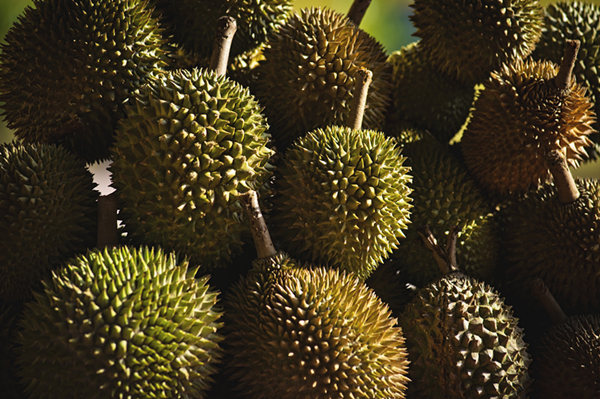 |
|
Photo provided to China Daily |
What I love about durians is that there is no laboratory needed to achieve the depth and range of tastes they offer. It's one of nature's masterpieces, dangling tantalizingly in the jungle. Durians, even those harvested from the same branch, can be so nuanced and dissimilar that tasting them is something akin to sampling fine wine.
Halliday, one of the foremost experts on the food of Thailand who has written restaurant reviews there for decades, said that durian reminds him of cr��me brulee. "It tastes like something that was prepared in a kitchen, not grown on a tree," he said after sampling a particularly delightful durian.
Durian season starts in May and tapers off around November in Thailand, depending on the latitude. But these days orchard owners have managed to coax the fruit from trees year round. They are prized by the Thai elite, who offer "gan yao durians," a delectable variety with a long stem, as gifts to business partners or senior government officials. (Yes, a durian bribe.) One fruit can easily sell for $50.
Durians also grow in Malaysia, Indonesia, the Philippines and other parts of Southeast Asia. In Malaysia the season extends until around the end of the year.
Halliday and I recently traveled to three places around Bangkok to sample durian: a high-end Bangkok fruit market; roadside stalls in Chinatown, where durian lovers can get their fix year round until the wee hours of the steamy Bangkok night; and the durian orchard outside Bangkok, cherished by durian groupies for its more than two dozen varieties and 300 trees.
"You can Google 'durian' and learn a lot," said Chartree Sowanatrakul, the owner of the orchard. "But when you come here you will go beyond Google."
Our quest was to try as many varieties as we could, especially those that are becoming increasingly hard to find with the homogenization of Thai fruit. (Like the production of greenhouse tomatoes in the West, Thailand specializes in breeding fruit for beauty and ease of transport, robbing fruit lovers of variety.)
Chartree's six-acre orchard is a two-hour drive from Bangkok in the foothills of the Khorat Plateau, which extends into northeastern Thailand. He served us freshly harvested durian, pineapple and mangosteen, a small round purple fruit with sweet white flesh that many people believe is the perfect complement to durian. The orchard has an unusual genesis. Chartree's father planted the trees from durian pits he collected in the trash bins of wealthy Bangkok residents in the 1940s, making it a sort of seed bank of varieties that are no longer in commercial production. We were treated to a wonderful variety that Chartree has named nom sot (fresh milk). Other types in the orchard include gop (frog), chanee (a type of monkey) and la ong fa (a Thai sweet).
"Old people come here and say the durians here taste just like the durians they had when they were young," Chartree said.
Durian is a very social fruit, usually eaten among friends. But I confess that I have sometimes eaten durian alone. Like eating birthday cake by yourself or drinking a tall boy out of a paper bag in a public park, it feels somewhat sad and illicit. Which brings up another point. As any durian fan will tell you, durian and alcohol don't mix.
With every durian season come stories about people who have collapsed - or worse - when they've had large quantities of durian and alcohol. I have never read or heard of a scientific explanation for this, if there is one. But it is widely recognized that durian season can be deleterious to your health. A few years ago, after a routine physical checkup, I was told by my doctor that my triglycerides, a type of fat in the blood, were above normal. She gave me a pamphlet in which the first piece of advice was to cut down on durian or avoid it altogether.
But many of my fellow durian-loving friends are getting along in age, and it reassures me that, well, they are still alive. There are, after all, much more dangerous foods to consume than durian. Blowfish comes to mind.
After a recent and particularly indulgent durian-eating marathon, when we felt like rolling away instead of walking, Halliday quoted William Blake. "The road of excess leads to the palace of wisdom."
The New York Times
|
|
|
|
|
|
|
|
